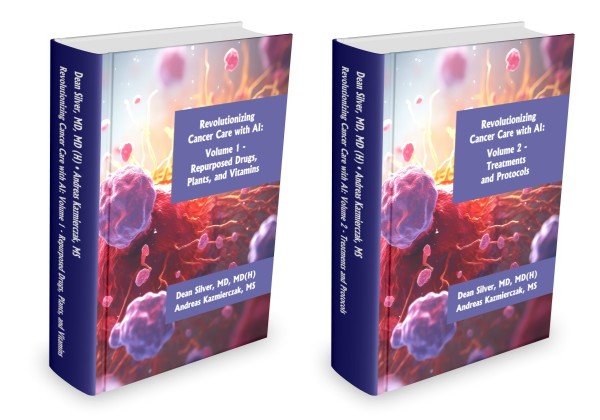In „Revolutionierung der Krebsbehandlung mit KI – Band 1: Umfunktionierte Medikamente, Pflanzen und Vitamine und Band 2: Behandlungen und Protokolle“ untersuchen Dr. Dean Silver und KI-Wissenschaftler Andreas Kazmierczak die bahnbrechende Rolle künstlicher Intelligenz in der integrativen Krebsbehandlung. Dieses Buch zeigt, wie KI-gestützte Analysen die Krebsbehandlung revolutionieren, indem sie die wirksamsten Behandlungen und Protokolle zur Bekämpfung der Krankheit identifizieren.
Dr. Silver, ein führender integrativer Onkologe, berichtet über seinen persönlichen Weg, den Krebs zu besiegen und 25 Jahre lang mithilfe innovativer, ungiftiger Therapien in Remission zu bleiben. Kazmierczak, ein KI-Experte, hat die CANCERASE-KI anhand von über 400.000 Seiten (Stand: April 2025) medizinischer Daten trainiert und bietet damit ein leistungsstarkes Werkzeug für die personalisierte Krebsbehandlung. Gemeinsam präsentieren sie einen innovativen Ansatz, der über die konventionelle Hochdosis-Chemotherapie hinausgeht, schädliche Nebenwirkungen reduziert und gleichzeitig die Ergebnisse verbessert.
Angesichts der rasanten Fortschritte in der KI und der hohen Investitionen in die Medizintechnik bietet dieses Buch Hoffnung und praktische Anleitung für alle, die nach intelligenteren und wirksameren Krebsbehandlungen suchen.
Dieses Buch repräsentiert ein neues Genre in der medizinischen Literatur – ein KI-validiertes, evidenzbasiertes Kompendium der Krebsforschung. Im Gegensatz zu herkömmlichen medizinischen Texten verbindet es die Leistungsfähigkeit künstlicher Intelligenz mit umfassender wissenschaftlicher Validierung und schafft so eine dynamische, aktuelle Ressource für die Krebsbehandlung. Es ist weder rein akademisch noch rein praktisch; stattdessen schlägt es eine Brücke zwischen Spitzenforschung und klinischer Anwendung und bietet einen fundierten, datenbasierten Ansatz für die Onkologie.
Dieses Buch ist ein bahnbrechendes Nachschlagewerk auf dem Gebiet der Krebsbehandlung und bietet einen unvoreingenommenen, wissenschaftlich fundierten Überblick über die neuesten Fortschritte in der Onkologie. Im Gegensatz zu herkömmlichen Büchern basiert dieses Werk vollständig auf wissenschaftlichen Erkenntnissen und stellt sicher, dass jede Aussage und Empfehlung durch gründliche Forschung untermauert wird. Die Inhalte werden mithilfe unserer proprietären medizinischen KI (CANCERASE GPT, siehe cangpt.ai) überprüft, die anhand von über 400.000 Seiten Forschungsberichten und wissenschaftlichen Materialien trainiert wurde.
Eine Pflichtlektüre für Patienten, Pflegekräfte und medizinisches Fachpersonal, die KI im Kampf gegen Krebs nutzen möchten.
